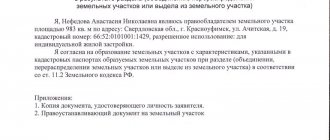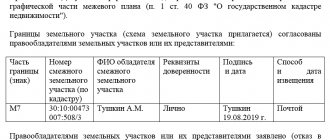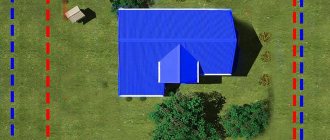The essence of the exchange of things between persons is obvious and is determined by the very actions of the parties to such an agreement. A land exchange agreement is no exception. It involves the transfer of ownership of a plot of land to another person in exchange for receiving another plot of land or some property. The legislator does not prohibit such relations, since the owner of the land has the right to dispose of the owned plot of his own free will, if this does not violate existing legal norms, as well as the rights and interests of other persons.
Concept and features of land exchange
The owner, in accordance with current legislation, has the right to dispose of his property.
This also applies to land plots, which can also be sold, donated, or leased. The execution of an exchange agreement is not excluded. This document has its own characteristics. First of all, this concerns the fact that the transaction is considered to be compensated, but a monetary obligation is excluded, since each party receives, by mutual agreement, a plot of equal value to it.
In essence, the exchange is similar to a standard purchase and sale, but with the following features:
- neither party receives an obligation to pay for the goods;
- each party has a dual nature, that is, it acts both as a seller and as a buyer.
The party can act as a simple physical person. person and organization. However, exchanges between persons belonging to different legal groups (citizens and organizations) are not prohibited.
How is the contract drawn up?
In accordance with Article 550 of the Civil Code of the Russian Federation, an agreement for the sale of real estate must be drawn up in writing. The land exchange agreement is also subject to exclusively written conclusion. If the legal requirements for the form are not met, the agreement is automatically considered invalid. An agreement of this kind obliges state registration of new owners and their rights in the branch of Rosreestr that is located on the site of the land being exchanged.
Legal regulation
The exchange of land plots is regulated by several legal acts. First of all, you need to pay attention to the following rules that will help you understand the issue and correctly formalize legal relations:
- Civil Code of the Russian Federation. Thus, Chapter 31 of this legal act is devoted to me;
- Land Code of the Russian Federation. This legal act establishes the features inherent in the exchange of land plots, while the Civil Code regulates general issues. So, for example, Article 39.21 deals with cases of exchange of land that is in state or municipal ownership, and Article 39.22 deals with the conditions of the transaction itself.
It is also worth paying attention to materials from judicial practice that will help clarify controversial issues. Thus, IP of the Presidium of the Supreme Arbitration Court of the Russian Federation No. 69 dated September 24, 2002 “Review of the practice of resolving disputes related to an exchange agreement” contains attempts to clarify some contradictory issues related to exchange.
Link to document:
| 1 |
| 2 |
| 3 |
Agreement conditions
The main terms of the exchange agreement, which must be agreed upon by both parties, are:
- establishing the subject of the agreement, that is, the areas transferred by both parties;
- identification of quantitative characteristics of contractual property;
- determining the equivalence of the value and properties of the plots or indicating appropriate compensation to achieve equivalence.
The essential terms of the transaction are agreed upon directly at the preparatory stage and are based on various title documents for land plots (for example, cadastral passports, reports on market value, etc.).
How to correctly draw up a contract for the exchange of land for an apartment? More on this later.
Procedure for drawing up an exchange agreement
The parties who decide to exchange the plots they own enter into a written agreement.
Notarization will not be required, but is not prohibited. Thus, Article 550 of the Civil Code of the Russian Federation establishes that transactions for the sale of real estate are formalized in writing. This will not be enough, since in accordance with Federal Law No. 218-FZ of July 13, 2015 “On State Registration of Real Estate,” plots must be registered, which is done after registration in Rosreestr.
The transaction is completely voluntary, that is, no one can force the owner to exchange the plot for another or another type of property.
In general, the conclusion procedure is carried out in the following order:
- the parties agree on the transaction and stipulate its terms;
- a written document is drawn up in three copies (if the object belongs to several persons at once, then the number of copies increases);
- The agreement is registered in Rosreestr.
The actual transfer of the plot can take place both before the conclusion of the agreement and after. This condition must be stated in the text of the transaction. In this case, it is necessary to either draw up a separate deed of transfer or indicate such a condition in the text. The law does not prohibit transfers to take place at different times.
Download the transfer deed to the land exchange agreement (sample)
Requirements for the contract
The text of the transaction must comply with legal requirements. Thus, it must contain the following information:
- document name and date;
- details of the parties;
- details of the sites that are transferred to each party;
- an indication of the equivalence of the plots or an indication of their value and the amount of additional payment (or other compensation) from one party to the other;
- other conditions, for example, the date of actual transfer, the condition of the plots, their features;
- the presence of any restrictions, for example, an easement;
- conditions for termination of the contract, jurisdiction in the event of a dispute and other additional conditions.
At the end, the signatures of the parties must be affixed.
Sample land exchange agreement:
contracts in .docx format
Notarization of the contract is not mandatory. However, taking into account the established judicial practice, which concerns the execution of transactions and disputes due to mistakes made when independently drafting the text of an agreement, arising due to the low legal literacy of the parties, contacting a notary will not be superfluous.
Required documents
Unlike notarization, holding state. Registration of the right obtained under an exchange agreement is mandatory. For this you will need:
- text of the agreement by the number of participants in the transaction, including the registration authority;
- a receipt for payment of state duty in the amount of 2,000 rubles or 350 rubles (if the land is intended for personal farming, agriculture or the construction of an individual residential building) - for individuals, 22,000 rubles - for organizations;
- passports or other documents confirming the identity of each participant in the transaction;
- an extract from the Unified State Register of Real Estate on the main characteristics and rights, containing information from the cadastral passport of the object;
- boundary plan of the site, if the cadastral registration procedure has not previously been carried out;
- power of attorney if the interests of one of the parties are represented by another person.
Carrying out land surveying will be a mandatory procedure if the site was not previously registered in the cadastral register. In other cases, the procedure will not be mandatory.
A document that confirms ownership will be required only if the plot was not registered earlier than 2008, that is, before state registration came under the jurisdiction of Rosreestr. If information about the allotment is in the Unified State Register of Real Estate, then Rosreestr will have all the necessary information in electronic form.
Registration
To transfer authority from one person to another, it will be necessary that all items in respect of which the transaction is made be registered. The parties must contact the Rosreestr office. In addition, it is possible to complete documentation when visiting the multifunctional center. Citizens will be required to prepare documentation. It is presented in the form of an application. It is written using the established template. The identity of each participant in the transaction must be confirmed using documentation. Documentation issued to organizations for conducting activities can also be used for this purpose.
IMPORTANT !!! When a representative is involved in the transaction, you will need to contact a notary office and have the power of attorney certified. Otherwise, this act is considered as inconsistent with reality.
You will need to collect papers of the right to establish value and those documents that are generated when transferring the objects of the transaction. Regarding property, these are certificates or extracts. They were made when contacting the Unified State Register of Real Estate. You will need to collect boundary documentation for the site. If the land has not previously undergone a registration procedure, land surveying is initially required. This requires payment of a state fee.
The amount varies depending on who pays. If this is a person, then the amount does not exceed 2 thousand rubles. For enterprises the value is 11 times greater. The registration period is reflected in the law. It depends on the chosen method of circulation. The period varies from a week to 12 days. In the latter case, a visit to the department of the multifunctional center is implied.
Tax features when changing land plots
Any contract whose purpose is to change ownership may have certain tax consequences. Thus, when making an exchange, it will be necessary to take into account not only the price at which the plots were valued by the parties, but also their cadastral value.
If the cadastral value of one plot exceeds the cadastral value of another, in fact one person will have a profit on which tax will be charged.
The legislator does not prohibit using the right to a tax deduction when concluding an exchange agreement. This will reduce potential costs.
Thus, Article 567 of the Civil Code of the Russian Federation introduces a provision according to which the same requirements apply to an exchange agreement as to a purchase and sale agreement. Each party is actually recognized as a seller with all the ensuing consequences.
At the same time, the Tax Code, paragraphs. 1 clause 1 art. 220, establishes the right to a property tax deduction when determining the tax base.
That is, in this case, the obligation to pay tax can only arise from the person who received an object of greater value without additional payment on his part (the cadastral value is taken into account, since according to the text of the transaction, objects are recognized as equivalent at the market price).
Do not forget that if the property was owned for more than three years and was acquired before January 1, 2021, or more than 5 years if it was acquired later, then no tax is paid after any transaction.
Procedure for compensation in case of unequal exchange
Initially, the agreement assumes the equivalence of the land plots. That is why possible future disputes between participants about the value of the transferred property are very limited. If the subject of the contract is an exchange of unequal plots, the party that transfers the plot that has a lower price receives another obligation to pay the difference in their value.
Such payment must be made before or immediately after the plot of lower value has been transferred to the counterparty. At the same time, the exchange agreement may establish a different procedure for compensating the existing difference in prices. Therefore, it is quite natural that all the necessary requirements and the form of compensation paid must be reflected in the text itself when concluding the contract.
Let's sum it up
An exchange agreement is a special type of transaction, the purpose of which is the mutual transfer of objects, in this case land plots. The transaction is close in nature to a purchase and sale, however, we are talking about an exchange for a specified object, and not for a sum of money. Relations regarding the exchange of land plots have their own characteristics related to the legal nature of the plots. After completing the procedure, information about the new owners is entered into the Unified State Register of Real Estate.
Read: Procedure for selling a land plot with an encumbrance
Transaction forms
In relation to the exchange of plots in the Russian Federation, the following forms of transaction are accepted:
- a simple form in writing, when the parties to the agreement must only certify it with signatures and then submit it to the Rosreestr authorities for state registration;
- a notarial form, in which certification of this agreement is not required, but in many cases it is still prescribed by a regulatory act.
Signs that personalize objects of exchange
The contract must necessarily describe the features that personalize the areas to be exchanged:
- area of alienated land plots;
- their cadastral numbers;
- the purpose for which they are used;
- real estate objects indicating their ownership, which are located on these sites.
Registration of a land exchange agreement is a responsible matter.
Also, drawings of the areas that are the subject of the agreement must be attached to the exchange agreement. The parties need to evaluate the relevant plots at cadastral value. In addition, it is necessary to evaluate various types of structures and real estate objects that are located on this land. The assessment is completed using acts determining the cadastral value and summary statements of assessment of structures. These documents are attached to the exchange agreement.
When registering it, the parties must provide their counterparties with the following information:
- about the presence or absence of land conflicts and disputes regarding the plots to be exchanged, as well as their legal nature;
- on the availability of existing easements;
- whether the plot to be exchanged is leased to a third party;
- on the transfer of this land as collateral.
The boundaries of the territory to which third parties have rights and the content of these rights must be indicated on the graphic plan of the relevant areas. The agreement specifies restrictions on proprietary rights that are associated with the technological, sanitary, protective and other zones established on this land, as well as with the classification of the lands of the site or part of it as those that have environmental, recreational or cultural-historical purposes.
According to federal law, registration is considered to be the performance of a certain legal action by bodies having the appropriate powers. Thus, ownership of a land plot arises simultaneously with the registration of the rights of one or another party in relation to it. The procedure for drawing up and registering an agreement for the exchange of a land plot under land law is completed at the moment when the information is entered into the unified legal register and the documents are issued to the applicants.
Exchange of municipal land for private land: general procedure step by step | Land expert
In Russia, cases of exchange of land plots owned by government agencies or municipalities for private property are legally established. This point is indicated in Art. 39.21 Land Code of the Russian Federation . The exchange of land plots with the administration is possible if the following grounds exist:
- If municipal or state ownership changes to private lands seized for the needs of government agencies or city government.
- When the possessions of government agencies or municipalities are exchanged for lands that are privately owned and intended for the placement of social infrastructure facilities or a transport point where these facilities will be located.
Sample exchange agreement
The parties to this transaction are equal in rights and it is understood that the plots are also equivalent. One participant, Party A, is the administration or government agency managing the territories, and Party B is the owner of the other area.
The subject of this agreement is land plots that will be subject to exchange in the future, namely, the property of party A and the possessions of the other participant.
In addition to the lands themselves, the subject of the transaction may be real estate that is located on these plots.
If the allotment and buildings are owned by the same person, it is allowed to draw up a deed of exchange together with the gratuitous transfer of real estate into state ownership or at the disposal of the city government.
Territories for various purposes can also participate in transactions of this type.
The agreement is concluded in writing , indicating all the essential points. Land plots must be of equal value and officially registered in an official manner.
The concluded exchange agreement (you can view and download here: [Sample land exchange agreement]) must also undergo mandatory state registration in Rosreestr.
A mandatory requirement for the exchange agreement, if there are buildings on the area, is that it requires an assessment of buildings that are not subject to gratuitous transfer to the disposal of the authorized agency.
The value of the plots to be exchanged must be equal, except for cases where, when the plot is withdrawn, the citizen is offered another plot in exchange, but at a lower cost. In this case, the owner is paid the difference between the redemption price and the cost of the proposed territory within a period of no more than 3 months from the date of transfer of rights to the alienated plot.
The procedure for exchanging municipal land for private
The exchange of land plots is carried out in accordance with the established regulations. The steps of the procedure are as follows:
- The parties wishing to make an exchange collect the necessary papers.
- If there are legal grounds, an exchange agreement is concluded between the participants.
- In the case where there are buildings on the territory that are not transferred to the administration or government agencies free of charge, an official assessment of this property is carried out.
- After the exchange agreement is drawn up, the transaction is state registered in Rosreestr.
- At the final stage, a transfer act is drawn up confirming the terms of the exchange transaction.
- After signing the specified document, the transaction is considered completed, and the plots are transferred from one manager to another.
Registration of property rights is carried out within a month , respectively, the period of time required to complete this transaction can be from one to two months or more .
List of documents
Within the framework of the Land Code, a list of mandatory papers required to formalize an exchange transaction is defined. These include:
- personal documents of participants - passports, statutory documents, details;
- documents of title to land territories that are subject to exchange;
- technical documents - cadastral passport of the site, certificate from the BTI about buildings, boundary diagram;
- certificates of absence of debts and encumbrances;
- appraisal report, if necessary;
- permission of the spouse to exchange, in relation to a private plot.
An example of exchanging municipal land for private
Boris Andreev received notification of the need to exchange his garden plot for territory in another location and an exchange agreement was drawn up.
The plots were of equal value, and no additional payments were required, however, a few months after the transaction was completed, the man demanded compensation, arguing that nearby plots had sharply increased in price and, therefore, he had missed out on benefits.
The administration responded to the citizen’s demands with an official letter , which stated that since the deal had already been formalized, Andreev no longer had any rights to the territory at the current time, and in connection with this, he also had no demands for payment of lost benefits.
Boris turned to a lawyer and, with his help, drew up a statement of claim against the administration’s actions. As a result of the court hearing, a negative decision was made regarding Andreev’s claim, since the transaction was concluded legally and in compliance with the established regulations. According to the judge's decision, the administration also did not violate the law with its actions.
Conclusion
Based on the above, a number of conclusions can be drawn:
- The exchange of state property or city territories for private lands is a legal act if there are legal grounds for this and all actions carried out by the parties to the agreement occur in accordance with the current regulations.
- The exchange agreement is a documentary registration of legal relations of this type and is a standard form filled out by the parties.
- Two parties take part in the transaction , one of which is the authorized agency that manages one plot of land and the second is the owner of another area.
- The agreement involves lands of equal value, and additional payment is provided only in exceptional cases.
- The subject of the agreement is the territories themselves and the buildings that are located on them. Buildings and structures are transferred free of charge, or an additional payment is made for them after a mandatory assessment.
- In the case of seizure of space for the needs of the city or government agencies and the offer to a citizen of space at a cost lower than the alienated plot, the difference is paid within 3 months after the seizure.
- The procedure for drawing up an exchange agreement is also enshrined in the Land Code and includes the stages of transfer of areas and mandatory registration.
The most popular questions and answers regarding the exchange of municipal land for private
Question: Hello, my name is Olga. Just recently I received a notification that my land, on which a small country house is located, will be confiscated for the needs of the city . A bus station will be built there.
In exchange, they offered me another plot. The new square is located in a good location, but I am interested in a number of other issues.
Firstly, is it permissible to exchange plots for different purposes and will the transaction be legal in the future, because my land was intended for dacha farming, and this area is an individual housing construction project. And secondly, my plot costs a little more than the one offered, and there is a house on the territory.
Should I be compensated for the difference between the values of the land, paid for the country house and what needs to be done for this? What period of time is given to make the payment?
Answer: Hello, Olga, in your situation you should contact the administration and ask for clarification on future exchange regarding two questions:
- the amount of compensation for the difference between the values of the plots;
- the amount of payment for a building located on your territory.
Before doing this, you will need to evaluate the plot and house and find out the market value of the property. If the administration refuses compensation, you have the right to file a claim in court and present there the appraisers' conclusion, as well as a certificate from the BTI about the existence of a building on the seized area.
As for the intended use, this moment is not a reason for recognizing the transaction as void, so you can enter into an agreement. All these issues are regulated by Art. 39.22 of the Land Code of the Russian Federation , therefore, when turning to the administration and the court, you can refer to this provision.
List of laws
- Article 39.21 of the Land Code of the Russian Federation
- Article 39.22 of the Land Code of the Russian Federation
Samples of applications and forms
You will need the following sample documents:
- Sample land exchange agreement
The following articles will be useful to you:
Call right now and resolve your issue - it's fast and free!
Source: https://zk-expert.ru/ispolzovanie-zemel/poryadok-obmena-municipalnoj-zemli-na-chastnuyu/
What is special about this procedure?
Exchange can be formalized not only between owners of territorial plots, but also other real estate (movable) property. Unlike a traditional purchase and sale document, in an exchange agreement the parties to the transaction receive not money for the transferred land plot, but rather an allotment. It must be equally exchangeable in all respects. If the value of one territorial plot is inferior to the second plot, in this case proportionate compensation should be provided for in the contractual terms.
And in case of donation there are no refunds. This agreement involves a unilateral act. Upon conclusion of the exchange, both counterparties receive compensation for the transferred land plot.
Transaction forms:
- Written. Contractors must draw up an agreement on an A4 sheet of paper and certify it with personal signatures, and also put a date at the end of the document.
- Notary. In legal practice, there is no mandatory certification by a notary. But there are some exceptions: the owner of the plot is a person who has not reached the age of majority (in this case the principal can act), exchange of shares (it is necessary to obtain permission from other participants in the property through written notice).
Too long?
Reload document
| Open in new tab
Regardless of which of these forms was used, the exchange agreement must be registered. Otherwise, it will be invalid. How to draw up a contract correctly, so as not to miss a single important detail, you need to look at a sample. If this is your first time encountering this in practice, you should seek help from lawyers, or follow this article.









